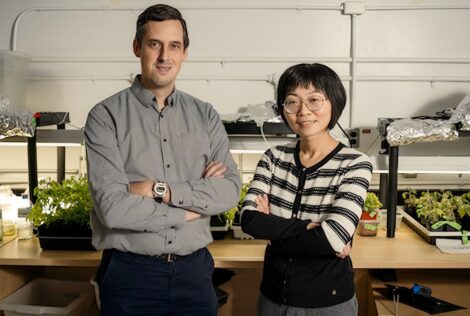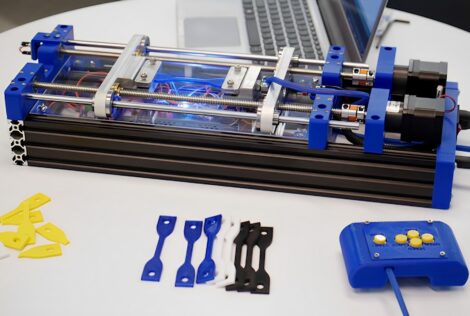

McMaster Engineering alumni are helping to fight climate change at a critical time. In Part 1 of this series, meet four people at Hatch, who are working in solar, nuclear and hydrometallurgy, and demonstrating overall leadership in the field.
Hatch is a global engineering consultancy, whose late founder and first president Gerald G. Hatch is the eponym for the centre for engineering experiential learning that opened on campus in 2017.
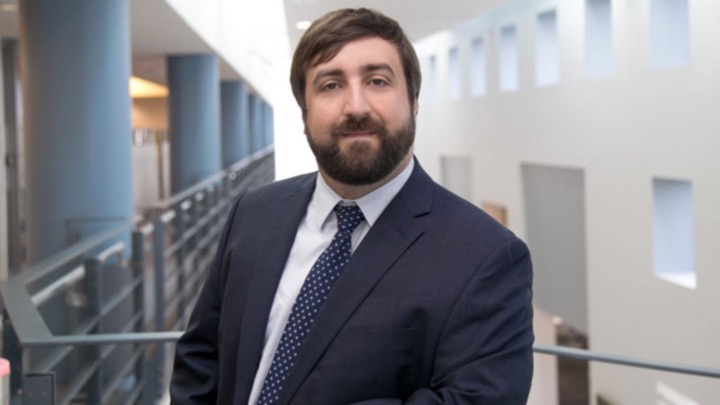
Andrew McLean, Solar lead
BEng – Chemical, 2009
Andrew McLean knows there’s joy in losing a boot in a muddy field – it means he’s putting plans into action.
A solar lead at Hatch, McLean has a rotating portfolio with responsibilities including energy modeling, design, and work layouts, as well as business development.
He has visited numerous solar farms in Ontario – reviewing installation quality, ongoing operational plans and performance – and supported major projects such as Rainy River Solar – a 210-acre, 25 MW solar farm.
McLean explains that a large part of the job is understanding where to find design efficiencies to make the economic case more viable.
It’s important and crucial right now… we are running out of time to make a smart energy transition. The more we can build and design, the better.
As the demand for electricity increases, so does the desire for green technology and terawatts of installed capacity. McLean is also involved in projects in the Caribbean where Hatch is assisting the transition from diesel plants to renewables.
“Solar is a key element of the future: the future of the energy grid as a whole,” he said.
Some of McLean’s best experiences have arisen in the field, where he evaluates the outcome of decisions made in the office. McLean has been to Haiti, the Cayman Islands, Jamaica, and the Atacama in Chile – the source of the highest solar radiation on earth.
Though McLean’s education at McMaster was in the department of chemical engineering, he notes that the learnings are highly transferable; McLean’s biggest takeaways that he implements in his every day include project management and the necessity of viewing work holistically.
“You can’t be focused on just the little details; you need to see the bigger picture.”

Megan Goodland, Nuclear Engineer-in-Training
BEng – Eng. Phys, 2018
Megan Goodland starts each day with the intention to improve the world.
“If you’re doing something for eight hours a day every day, you don’t want to be putting something negative into the world,” she said.
“We need electricity, we need power, and we need high temperature steam to do everything that keeps the world running. With that being constant, what’s a way we can make that happen in the least harmful, most sustainable way? In my opinion, that’s with nuclear technologies.”
This engineer-in-training, who also has an MASc, works in the nuclear business unit at Hatch, which focuses on up-and-coming nuclear technologies like small modular reactors (SMRs) and nuclear fusion.
Goodland’s main project is with General Fusion, where she has been working on the safety case and designing a liquid lithium system for a demonstration fusion device. This device will be built at the UK Atomic Energy Authority’s Culham Campus. There’s also an element of serendipity to it: while studying at McMaster, Goodland received a scholarship for a summer internship at this site.
There’s a saying in the community, Goodland said, that nuclear fusion is 30 years away and always will be – but she mightily disagrees with implications that pursuing it has little impact. Whether it be nuclear fission or fusion, Goodland advocates that any support for both contributes to the goal of tackling climate change.
“We just got to go full force on everything. And why not, if we have the ability to,” she said.
When Goodland thinks about her days at McMaster, she remembers attacking problems with a positive attitude in a part of the Burke Science Building endearingly called “the Quantum tunnel.” Getting accustomed to information overload, she said, has helped her anticipate and understand what engineers from different disciplines need to get the work done.”
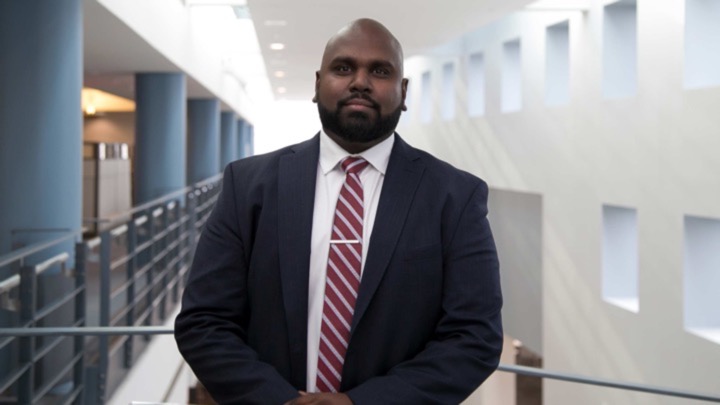
Mario Pieries, Director Business Development & Strategy (Nuclear), Sr. Project Manager and Consultant
BEng & Society – Chemical, 2007
Mario Pieries’s drive is captured in a journal, lovingly kept for his eight-year-old son. It maps out his career journey and how he’s trying to move the needle for the world and impact climate change.
For the past five years, Pieries has been working with Hatch to help the industrial sector find greener solutions and make a bigger dent in this global crisis.
“I don’t want that to be a problem for my grandkids,” he said.
Pieries, who also has an MEng, is the director of business development and strategy (nuclear), a senior project manager and consultant at Hatch.
Also, a board member of the Organization of Canadian Nuclear Industries, Pieries has been involved with maintaining Canada’s existing nuclear fleet, as well as supporting initiatives related to the SMR Action Plan while also assisting companies with technology development to decarbonize industry.
He acted as a sponsor for a feasibility study in Bruce County focused on producing hydrogen from off-peak nuclear and renewable electricity generation. The study assessed the technical, financial, socio-economic opportunities and challenges associated with hydrogen production, storage and use in the county with the aim of catalysing the hydrogen economy in the province of Ontario.
“There are opportunities to decarbonize not just the electricity sector, but the transportation sector too,” he said.
Pieries said he’s seen how contributing to solve one small problem “can have cascading impacts throughout the industry.”
He’s also seen how the focus on climate change has altered since his own time at McMaster – where he had incredible mentorship by professor (emeritus) Brian Baetz. “A fire has been lit under people’s feet,” he said.
As the industry changes given the impacts of climate change, Pieries said there’s exciting prospects for McMaster graduates to be part of the solutions.
“There’s very smart people out there, and a lot of them are coming from McMaster,” he said. “It’s a really great long-term career…the need for having really, really good people enter the industry is starting to be really important.”
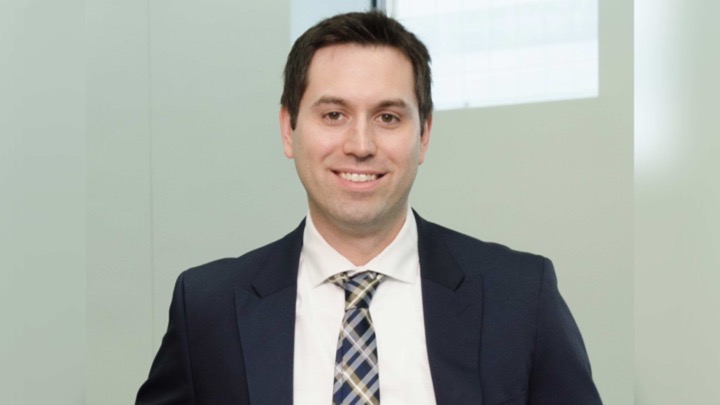
Mark Machado, Senior Process Engineer, Hydrometallurgy
BEng – Chemical, 2006 and MASc, 2008
Mark Machado, P. Eng., says the recovery of lithium can be like extracting a “needle out of a haystack” – and the incoming “demand tsunami” only serves to emphasize the cruciality of developing responsible methods to retrieve it.
This senior process engineer specializes in designing hydrometallurgical processes. He explains there’s been a significant uptick in demand for metals that are critical for the energy transition, with lithium among the most dominant.
As the transportation fleet becomes electrified, he said, a global race to develop new innovative extraction technologies is on – and more questions are being raised on how to source and extract lithium for batteries in a sustainable and efficient manner.
“How do we develop these processes in a way that there’s very low carbon intensity and very low impact to the environment?” Machado said.
One project Machado is working on utilizes a geothermal power source in the Salton Sea in California to also produce lithium. Plans are to take advantage of the hot geothermal brine, flash off steam that will feed into a turbine for power and to extract the lithium selectively prior to reinjecting the brine back into the resource.
“It’s never been done before, the use of these technologies in this way to extract lithium at this scale,” he said.
Uncovering “new exciting things every day,” Machado said, is what he enjoys most. It’s enriching, he said, to constantly challenge yourself and develop new subsets of knowledge that are required to do the job.
“You’re very much on the cutting-edge and innovating every day. That’s what’s exciting about it,” he said.
A two-time graduate of McMaster University, Machado said he knows the foundation developed at McMaster helped him work in diverse teams at Hatch, which are critical for achieving success.
“I think McMaster does a really good job of bridging the gap between these cross-disciplinary teams fostering an environment for cooperation and innovation.”

